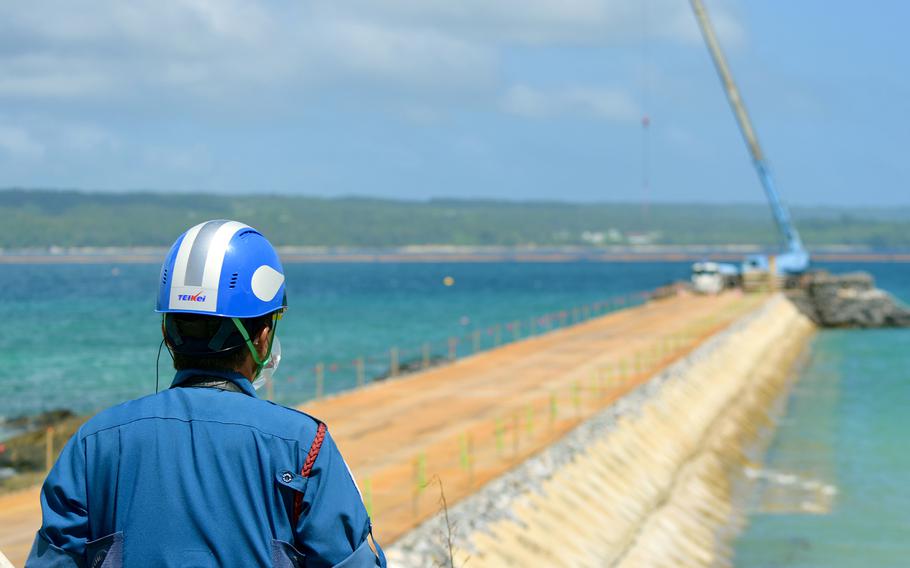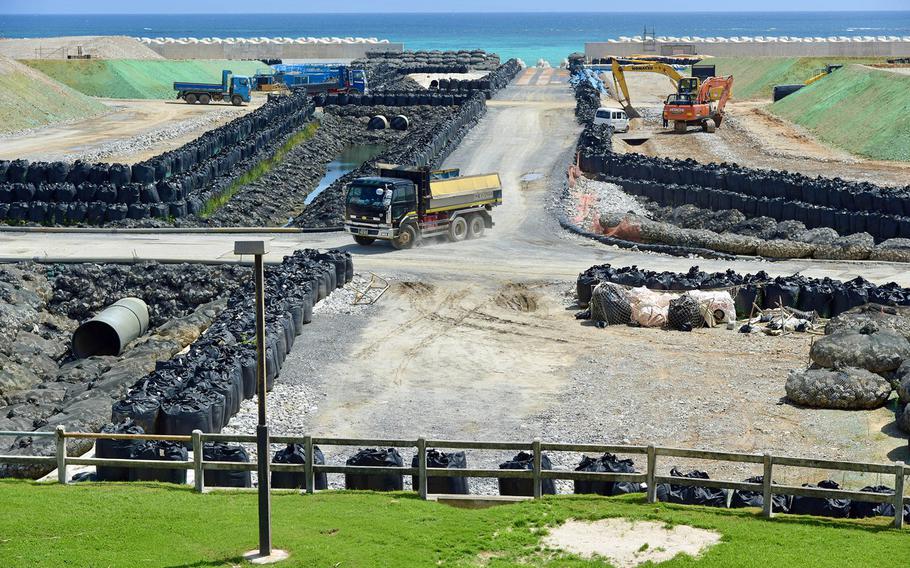Marine Corps
High court dismisses Okinawa’s legal challenges to Marine Corps runway
Stars and Stripes March 17, 2023

Construction work continues on a Marine Corps runway into Oura Bay at Camp Schwab, Okinawa, Sept. 15, 2022. (Frank Andrews/Stars and Stripes)
NAHA, Okinawa – A Japanese court on Thursday struck down a pair of legal challenges brought by Okinawa Gov. Denny Tamaki to stop the construction of a Marine Corps runway at Camp Schwab.
A three-justice panel of the Fukuoka High Court’s Naha branch dismissed two lawsuits seeking to block changes to construction permits required by Japan’s Ministry of Defense to finish the project.
The judges disregarded Okinawa’s argument and held instead that Tamaki’s denial of the change request was “illogical” and an abuse of power, according to a copy of the decision released after the hearing.
The court “dismisses this appeal,” Presiding Justice Yutaka Taniguchi told the packed courtroom Thursday. The hearing lasted less than a minute.
Runway construction at Camp Schwab on Okinawa’s rural northern coast is decades behind schedule. It is meant to replace Marine Corps Air Station Futenma in urban Ginowan, which Japanese officials consider inherently dangerous due to its central location in a densely populated area.
Tamaki disagreed with the court’s decision and promised an appeal, he said in a statement posted Thursday afternoon to the prefecture’s website.
“I don’t think that my decision to deny the change of plans was wrong,” Tamaki wrote. He called the ruling unacceptable and said it violated local autonomy.

Construction work continues on a Marine Corps runway into Oura Bay at Camp Schwab, Okinawa, Sept. 15, 2022. (Frank Andrews/Stars and Stripes)
A spokesman for the Ministry of Defense did not respond to an emailed request for comment Friday.
The lawsuits, filed with the high court on Aug. 12 and Aug. 24, challenged a series of decisions in April by Tetsuo Saito, the minister of land, infrastructure, transport and tourism, that struck down Tamaki’s denial of the permit changes and forced his approval.
Tamaki argued that the soft seabed in the construction zone poses a hazard and that Tokyo had failed to consider the environmental impact on the endangered dugong, a cousin of the manatee protected by Japanese law and whose numbers are dwindling.
Saito called Tamaki’s permit denial “illegal and unreasonable” and gave him until April 20 to approve the changes.
Oral arguments in both suits were heard on Dec. 1.
About 50 people, mostly elderly Okinawans, filed into the court room Thursday afternoon in anticipation of the panel’s ruling. About 30 activists carrying flags and banners peacefully rallied in a park across the street.
The first lawsuit was dismissed without prejudice because Okinawa lacked standing to challenge Saito’s decision, the judgment states. In the second case, the panel ruled Tamaki’s argument was irrational and they chastised his decision to file suit.
The prefecture on Dec. 8 lost a similar lawsuit before Japan’s Supreme Court in Tokyo. It has lost seven lawsuits over the project and has withdrawn four others. One remaining lawsuit goes before Naha District Court in April.